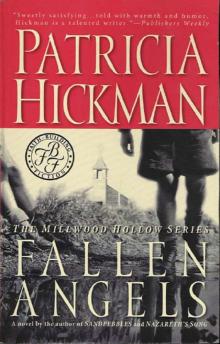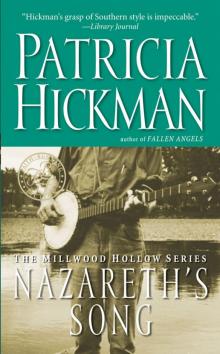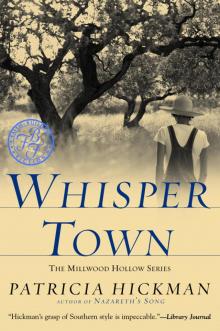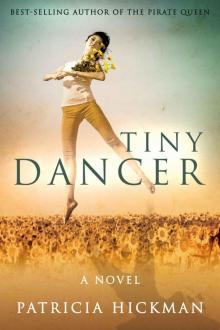- Home
- Patricia Hickman
Whisper Town Page 19
Whisper Town Read online
Page 19
“We are late, people!” Angel stumbled down the hall, jumping into her stockings. The noise she made set Ida May to wailing hopelessly.
“Finally it’s the end of the world,” said Willie. “I’s afraid this’d be all there was to it.”
“I forgot pencils.” Ida May cried and laid her face on the kitchen table.
“Everyone, get in the truck and I’ll see you get to school,” said Jeb.
Lucky came out with her hair tied up in rags, something about her expressing her opinion of all of those with so little hope on a Monday morning. “Angel, you’d think you was losing a birthday or some such.” She held out her hands to Ida May. “I got a pencil if you will put a sock in that alarm of yours.”
Jeb covered his head with a hat and said, “Might you have coffee on the brew by the time I return?”
“You’d best strap on some galluses, Reverend, pull you on some trousers.” Lucky covered her eyes with both hands.
Jeb had fallen asleep Sunday evening in his Sunday shirt and not a whole lot of anything else. What with Fern’s scent lingering on the collar, it had seemed a shame to change out of it. “Meet me outside,” he told Willie and Ida May. He gave Willie the truck key, since he had gotten good at warming up the Ford.
Angel stormed past, yelling that she had dibs on the front seat and saying, “Jeb, you’ll catch your death!”
Jeb found his clothes by the door, his everyday trousers he had preached in on Sunday. He picked them up but nearly knocked Lucky down, running through the hall. “You’re smiling this morning,” he said.
“We had us a good Sunday, Reverend. I’d say things is looking up from now on.”
Jeb chided his own thoughts. Here was Lucky already on Monday’s good side and he’d gotten up troubling over subjects left unsaid yesterday, of those who did not come forward and greet Vera Blessed. “Coffee?”
“I’ll make your coffee, Reverend. Black. Side of biscuits,” she said.
“You’re a good girl.”
“That’s what I’ve been saying.”
Nazareth seemed to grow for an instant, like a wintered-over tract that had suddenly greened, life coming out of it and feeding lonesome souls.
Jeb returned to find a car parked out front that belonged to Louie Williamson, of that he felt certain. Both rear tire rims had rusted around the corners, red paint dabbed at the edges.
Louie sat at the kitchen table drinking coffee with one hand and holding Myrtle by his free arm. Lucky filled his cup and filled him in on all that had transpired on Sunday.
“Lucky’s told you about Vera coming yesterday, I see,” he said.
“Vera told me last night at prayer meeting. I’m surprised you’re not roasting over an open fire, so to speak. So that note you had me pass to her, it was an invite. I didn’t open it,” said Louie.
Jeb took his seat across from Louie.
“I asked him if my daddy had anything to say about Momma’s coming down and seeing me and Myrtle, but he said he didn’t know,” said Lucky. She pushed Jeb’s full cup to his side of the table.
“John Blessed is prideful, that’s all I got to say. If I say anything else, it’s gossip. Your baby’s giving back a little of her breakfast.” Louie reached for a towel and wiped the baby’s face. “Vera says you are a nice preacher and she is glad Lucky came to stay with you. I can tell she wants things back like they’re supposed to be, though.”
“Daddy’s too hard on me, like he was too hard on Jewel. Jewel said yesterday that he won’t talk to her still,” said Lucky. “He blames Jewel for what happened to me, but I lay half the blame on him.”
“If you go turning hard, then you and your father will never meet in the middle. One of you at least has to soften. It’s more likely to be you.”
Jeb told him, “John Blessed sounds like my daddy, hard-nosed and not able to get past his own laws so’s he can reach into what’s human, or humanly possible.” Jeb’s brother Charlie told him their father still thought of Jeb as the black sheep. “I hope John doesn’t wait until he’s too old to change.” Jeb imagined his father turning to stone before he’d come to see him or ask for him. “My daddy sits out on his porch with all his thoughts of me frozen in time, as though I was still sixteen and stealing chewing tobacco.”
“People change,” said Louie.
“If he loved me, he would tell me, that’s the way I feel,” said Lucky. She picked up Myrtle and took her to Jeb’s bedroom to change her.
Louie got up and carried the coffeepot back to the table. “Lucky’s a strong girl. I wish her daddy saw in her what I see. Smart girl, and she says she’s going to teach. I believe she’ll do whatever she says she’ll do. You take Jewel, now that girl will be dependent on whatever man drags her out of Hope. The kind of men she goes with, they don’t stay around.”
“What happened to Jewel’s face?”
“Jewel’s not really John’s daughter, I didn’t know if you knew that. Vera came to John with Jewel. She must have been three. That little girl’s own daddy did that to her, I’m told, to spite Vera. Vera was what they call a natural beauty. Jewel’s daddy, he imagined things about Vera that were not true. He came home drunk one night and accused Vera of seeing another man. Vera, she stood up to him. Jewel was hanging onto her momma’s dress, crying, and that made that man so mad. He sliced her, cut that little girl. Vera left him after that. She met John in church. My daddy was the preacher back then, before he retired and I took over Church of Eternal Hope.”
Jeb filled both their cups.
“John did well by Jewel, until Vera give him his first child, a son. You met Ruben.”
“Ruben is John and Vera’s only son?”
“One and only, and spoiled. He don’t do wrong in the sight of his daddy. But Ruben has some goodness in him, so he looks after his sisters to make up for what John lacks, so to speak.”
“Has anything, any words, ever passed between Ruben and Frank Pella?” asked Jeb.
“Frank runs with a rich crowd of young men, bright, but they run to trouble. A young man from our church was found beaten and tied to the railroad tracks, those tracks that run between Hope and Texas. If his brother hadn’t have found him, the five-twenty A.M. might have ended things for that boy. Some people think that bunch that Pella runs with did it. But that boy never said, and who would have helped out if he would have spoken out?” Louie rubbed the top of his cup. “To answer your question, Ruben’s not confronted Frank Pella. The matter troubles me some.”
“I can see why it would,” said Jeb.
“Ruben is not one to let matters drop. Jewel and Vera begged him not to confront Pella, that Pella’s bunch would not let it stop until it completely stopped.”
“Ruben listens to his momma?”
“Like I said, he’s got some goodness. But whether or not he still listens to his mother is a guess.”
Ruben had not taken Myrtle into his arms the way Jewel had yesterday. He had come because his mother needed someone to drive her, and that was that. “I’d like to ask you to do one more thing, Louie, if you’re up to it,” said Jeb.
“Are you trying to raise a ruckus, Jeb?”
“Sometimes you have to raise a little dust to get to the better dirt. I’m plowing a new row, that’s all.”
“Like I told you before, I’m not afraid of monsters, Jeb.”
23
THE SCENT OF MELTED WAX AND DUSTY rafters permeated the church, a smell like prayers and sin melting in the room, burning, dripping off, and then rising up and collecting on the ceiling, but not rising any farther. Jeb had not thought before of how often he had stared at those rafters the mornings and evenings he had prayed alone. Even after the congregation had collected under the roof and had sung until chasing the last particle of cold from the room, he imagined the rising of desire accumulating under the roof and then sinking back to the floor at the last amen.
Back in his bad-boy days, he had not thought much about prayer, but now it came to him that praying wa
s like carrying heavy packs onto a battlefield, only to load heavy cannons with heavy artillery and then propel heavy weapons into the air. The war of prayer commenced by a few half-uttered phrases, the bowing of heads, closing of eyes had lost ground when good men had forgotten the war of it and the place of it.
He had cast his eyes outward for too long, thinking the battlefield smoldered far beyond the borders of his own hamlet, not acknowledging the inward place of desolation. Oh, wretched heart! he professed, that you could see the hearts crushed and scattered along your journey!
He desired to know how the inward places had fallen so deeply into neglect and he prodded heaven about the matter; if the love for human souls had been traded for the singing of songs, the uttering of the same words from the same prayer books, and the naming of external sins, then how might he awaken hearts to the distant drumming over the hill?
Or perhaps the soul found solace in collecting its sin into a row of tin soldiers—abstain from these things and you will be holy. Yes, that was it! Self-righteousness was born of tin and things easily conquered, the toy soldiers of the church. We have settled for the war games of children, Father, and neglected the trenches of humanity. He prayed God would show him the difference, allow him to smell the stench of his own neglect. I am a rotting corpse, O God! Collect me now, my pile of bones into a heap and set fire to me. Make me a light on your hill. Let them see that from ashes, you rise!
He stoked the fire inside the stove and the first family arrived for the midweek prayer meeting.
Fern came early, smelling like fresh air, like she had been out running in the cold.
Frank Pella’s name was whispered more than once as several families bustled in out of the January air.
Jeb said to Fern, “I see Lucky and Angel coming up the steps with Myrtle. I don’t want Lucky to hear all this talk.”
“I’ll see she’s seated with me.” Fern turned and met Lucky and Angel at the door and led them to her pew.
Willie and Ida May burst in and sat next to a family behind Angel and Lucky.
Jeb called the meeting to order and prayed. He checked his watch and glanced through the window. A small parade of car lights wound through the tree line. He took his place in front of the shepherd’s bench while the congregants rose to sing.
Fortunes rise and fall on the backs of risk takers. Like me, Jeb thought. It seemed his fortune never amounted to much. He rolled his dice and let those things fly that festered inside him. With every eye seeming to look clean through to the back of his head as he read from the Book of Jeremiah, he told about the Balm in Gilead, yet how there had been no healing, no remedy. “I think some of us might believe when we read that text that God’s people are at the end of their row when the Lord says, ‘Thou art Gilead unto me, and the head of Lebanon: yet surely I will make thee a wilderness, and cities which are not inhabited … Woe unto him that buildeth his house by unrighteousness, and his chambers by wrong; that useth his neighbour’s service without wages, and giveth him not for his work’” Jeb turned to the next text and read, “‘Go up into Gilead, and take Balm… for thou shalt not be cured.’”
A man cleared his throat from a middle pew.
“No healing for our towns, our communities, or our nation. We would be left in a bad way if it had not been for a newer Balm.”
A sound like the fluttering of pages rippled through the pews, the women curious about the text.
“Because of God’s plan of redemption, there is a Balm created for the healing of the nations. Through the suffering Christ, there is concocted a Balm. When hearts are torn and angry words are hurled, a Balm is made available. We may not see it for its healing elixir or its power to heal the poor, the lonely, and, yes, even the chasm between human differences; we may not realize that even if we render it powerless in our own heart, its power to heal is not diminished.”
The sound of a choir lifted outside, ringing through the trees:
There is a Balm in Gilead
to make the wounded whole.
There is a Balm in Gilead
to heal the sin-sick soul.
Sometimes I feel discouraged,
and think my work’s in vain.
But then the Holy Spirit
revives my soul again.
Two boys jumped up and ran to the window.
“‘There is a Balm in Gilead,’” said Jeb. “‘It makes our wounded whole. It heals my sin-sick soul.’”
The voices rose louder, drawing closer to Church in the Dell. Josie Hipps tapped Mellie Fogarty’s shoulder. Freda Honeysack covered her mouth with her hand. Will closed his eyes and mouthed the words in silence.
“It is cold outside, my friends. Should we open our doors and let strangers come into our warmth? Can wounded travelers find in this sanctuary the Balm of Gilead?”
Oz glared at Jeb. He sat in the rear of the church.
Greta and Sam Patton got up to leave.
Floyd Whittington said, “I think I get it.” He got up and went to the back doors and opened both of them. “Come in, neighbors,” he said quietly, “where it’s warm.”
Jaunice Williamson came through first, her white hair all swaying and moving as she led the choir down the aisle.
“Welcome, friends.” Will came to his feet and bowed as the singers passed.
The members wore satin robes that gleamed from the overhead light, blue as the seas.
Angel and Lucky stared, mouths agape.
Louie entered holding a box of new candles. He gave them to Willie and told him he could pass them out. Willie gave one to each choir member and then walked up the aisle to hand one to Jeb.
Jeb lighted his at the altar and Louie did as he did, lighting his candle from the altar, and then they held out their candles while each church member and choir member came forward to light their light by the ministers’.
Oz ran out of the church and yelled out something that no one could understand. Floyd closed the doors and got in line to light his candle.
The door opened once more and Sam and Greta Patton slipped quietly out into the cold.
Jeb invited Reverend Louie to take a seat on the altar.
It was strange the way a chorus of opinion rippled through the church without anyone saying a word, like every sitting-down place had shifted and hearts had skipped a beat.
Jeb came down on one knee in front of Louie. Ida May and Willie, who no one had noticed had been waiting outside the back church door, opened the door all the way. Willie carried in a bowl of water and Ida May a towel that she handed to Jeb as he had instructed. Ida May smiled even though her teeth were chattering from waiting in the cold.
“Reverend, may I serve you?” Jeb asked.
Louie looked up and down the aisle until he made eye contact with his wife. Then he nodded at Jeb.
Jeb pulled off the minister’s right shoe and sock and then his left. He washed his feet and then sat back. Will and Freda came up front and knelt. Freda greeted the minister and told him he had the best choir she had ever heard. Will washed Louie’s feet and then handed the towel back to Jeb.
Jeb set the bowl aside and came to his feet. Louie came up too, standing on bare feet. He and Jeb embraced. Fern stood up and clapped. Angel joined her along with at least fifteen people and that caused everyone to at least stand.
Louie said, “I was wondering why you told me to wear my good socks.”
Will laughed and that caused laughter to ripple through the congregation.
Jeb asked Louie to pray for Church in the Dell and Louie prayed. Some of the women sniffled. Louie asked Jeb to pray for the Church of Eternal Hope. Jeb blessed them and he took Louie’s hand. “Sometimes we don’t know what has slipped into our heart until God confronts us,” he said. “My human nature hates confrontation. Hatred is a small thing that squeezes in through our narrow places, places not made big enough for love. It can poison us to truth and make us complacent, not wanting to deal with what is unfamiliar.”
“I agree, my brothe
r,” said Louie. “My heart grows weary and angry and then complacent. I can be smug about myself, thinking I know it all, that I’m always right, and I forget about the neighbor who is suffering quietly while I show off my righteous rags.”
A quiet rested on the congregants.
A woman from the Eternal Hope choir held up her thin hands and said, “I confess that I knew about the little Blessed girl and did nothing. She wasn’t to blame for her pain, but I turned my back on her.”
“We all did,” said Will Honeysack.
The choir woman said, “My kids is grown and I got a room I use for sewing that can be put to better use. I want to say right now in front of all you good people, Lucky and her precious girl child can come and stay with me.”
Freda cried. Josie kept her face in her hands.
Another woman from the back of the sanctuary offered a dress to Lucky, a man offered a crib for Myrtle.
“Wait, I have something to say.”
Jeb looked back toward the entry for the one who spoke, but was unable to see for the throng down the aisle. “Sir, speak up.”
“I’m John Blessed,” he said. The choir members parted. John, Vera, and Jewel had slipped in during the prayers. John moved around the choir members until he arrived at the middle pew, where Lucky sat. He took Myrtle out of her arms and kissed the baby’s face. He handed the baby girl to his wife and then threw his arms around his youngest daughter. “You look all grown-up.” He cried.
Fern blubbered. She dug through her handbag and pulled out a handkerchief.
“I haven’t thanked you, Reverend Nubey, for seeing after my baby and my grandbaby. It’s time for them to come back home, though,” said John.
The choir members clapped and laughed and then took to hugging one another. Will Honeysack, who could not sing on key, sang:
This little light of mine
I’m going to let it shine.
Much to everyone’s relief, Louie joined him in a nice baritone, which enlisted everyone to sing:

 Painted Dresses
Painted Dresses The Pirate Queen
The Pirate Queen Fallen Angels
Fallen Angels Earthly Vows
Earthly Vows Nazareth's Song
Nazareth's Song Whisper Town
Whisper Town Tiny Dancer
Tiny Dancer